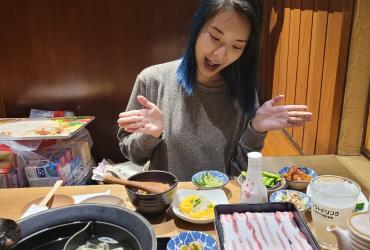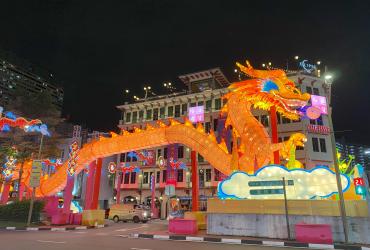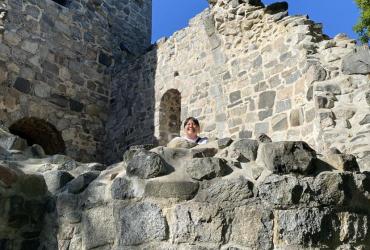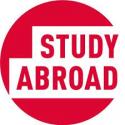Orientation and First Weeks
Then before I knew it, my departure date arrived! I had to get a COVID test done the day before I left, and had to get tested again in Korea (this is no longer required of travellers anymore). I took a direct flight from YVR to ICN with Korean Air on August 23 and arrived in Incheon on the evening of August 24. I took the limousine bus to Seoul, where I stayed in Hongdae for the first few days.
Upon arriving in Korea, I recommend buying and adding money to a T-money card (which is used for public transit) right away. When refilling your T-money, you can take it to a convenience store and ask the clerk to do so, or at any train station transportation card kiosk. You can only use cash when refilling it.
A day after I arrived I had to get a PCR test done, which is no longer required for travelling. The testing was free since I was a long-term visitor and held a visa. After my 2-day stay in Hongdae, I checked into my single room at Yonsei’s SK Global House. To check in, I needed to bring a negative tuberculosis test result and a photocopy of my passport. The room was a good size, with a mini fridge!
There were orientations for SK Global and International House and for Yonsei exchange students. I didn’t go to the dorm orientation, but I went to the Yonsei one. They had a couple of K-pop performances, went over life in Korea, and advertised club activities so I recommend going (I think it’s required anyway).
Once classes began, I took a Korean language placement exam for Yonsei’s Korean Language Institute (KLI), in which I placed at level 2. In the exam, you are tested on reading, writing, and speaking. If you feel like you don’t belong at the level you were placed in, you can ask to be placed elsewhere. The Korean classes are conducted completely in Korean, so it was great to be fully immersed in the language.
Since SFU requires a minimum of 9 credits while on exchange, I did the minimum and took Korean (6 creds) and a 300-level education class (3 creds). I was on campus three times a week, luckily the KLI building was right beside our dorm building. Campus life was great, Yonsei University is much much bigger than SFU, so it was very hard to navigate.
Day to Day
I had classes on Mondays, Wednesdays, and Fridays, so those days were often spent on campus. Yonsei University is an extremely big campus, despite my 4 months staying there, I probably only explored 40% of it. When I was on campus, I often stayed in their library to study, or could be found chowing down on their super cheap Korean meals in their cafeteria called 맛나샘 (mat-na saem). Since I lived on campus, it was really easy to walk over to my classes and also walk to the nearest downtown-like area called Sinchon. I spent many of my days in Sinchon, which was always bustling as it was central to many other universities, not only Yonsei. It is home to many cafes, restaurants, and shopping areas, and came alive in the nighttime.
My dorm luckily was connected to a strip of smaller restaurants, cafes, and (24 hour) convenience stores, so I only had to go downstairs if I was craving a banana milk or ice cream! This was a regular occurrence :)
Learning and Adaptation
I began my study abroad journey when I was already in my fourth year, so by that time I was well into my regular life as an undergrad student. As a result, I think my adjusting to school in Korea was practically seamless. I have always been pretty good at studying and keeping up with my work, so I had no issues submitting regular assignments and collaborating with other students in discussions and projects. One of my classes was open to both international and Korean students, so I had the opportunity to make friends with domestic students as well! Adapting to the Korean university system was not difficult for me, especially coming from the rather-difficult linguistics program at SFU :)
Cultural and Environmental Observations
South Korea is a very homogenous society. I am sure you can only imagine the stares I would get from strangers as a South-East Asian person who for some reason, can speak Korean fine despite not looking like it. I lived in a very tourist-filled area, and even then I would be asked about my background and be stared at for speaking English with my friends. The realization that I would never be able to fit into their society no matter how much I tried was a little bit discouraging, but was all the more eye-opening to experience.
Social and Extracurricular Activities
Since I was in Seoul for one semester, I tried to make the most of my stay by visiting all sorts of places, from the major tourist spots to restaurants that were recommended by my Korean friends. Here are some places in Seoul I really recommend going to (not an exhaustive list!):
-
N Seoul Tower - buy a ticket from Trazy or Klook for a cheaper price!
-
Gyeongbukgung - one of the most popular temples in Seoul, if you visit while wearing a hanbok (Korean traditional clothing), entrance is free!
-
Coex Mall - this mall is home to the famous Starfield Library and Coex Aquarium, and there are very good eats here too!
-
Gwangjang Market - one of the most popular street food markets in Seoul, it was featured on Netflix! Definitely try their rice donuts and mung bean pancakes!
-
Banpo Rainbow Bridge - the bridge only has the light shows from Apr-June, July-Aug, and Sep-Oct, so if you’re in Korea during these months, bring a blanket and enjoy the lights!
-
Lotte World - a popular amusement park in Seoul! I recommend going if you like rollercoasters, maybe even renting out school uniforms to wear while you’re there!
-
Haneul Park - a huge park that’s covered in silver grass; you can’t leave Korea without seeing Haneul Park!
I visited many other places, but these are some of the places you can’t miss!












